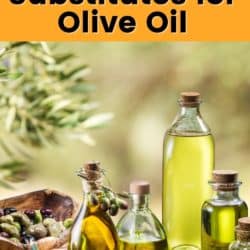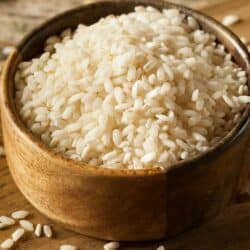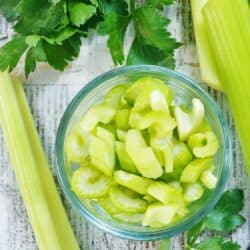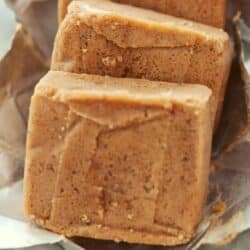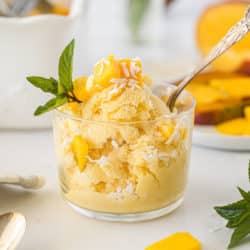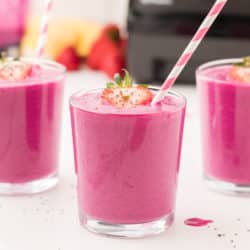5 Substitutes for Olive Oil in Dressings or Cooking
Olive oil is a neutral-flavored oil that is used worldwide. Learn five healthy substitutes for olive oil if you don’t have it in your kitchen or want to use something else. Skip the cheaper alternatives and choose one of these olive oil alternatives instead!
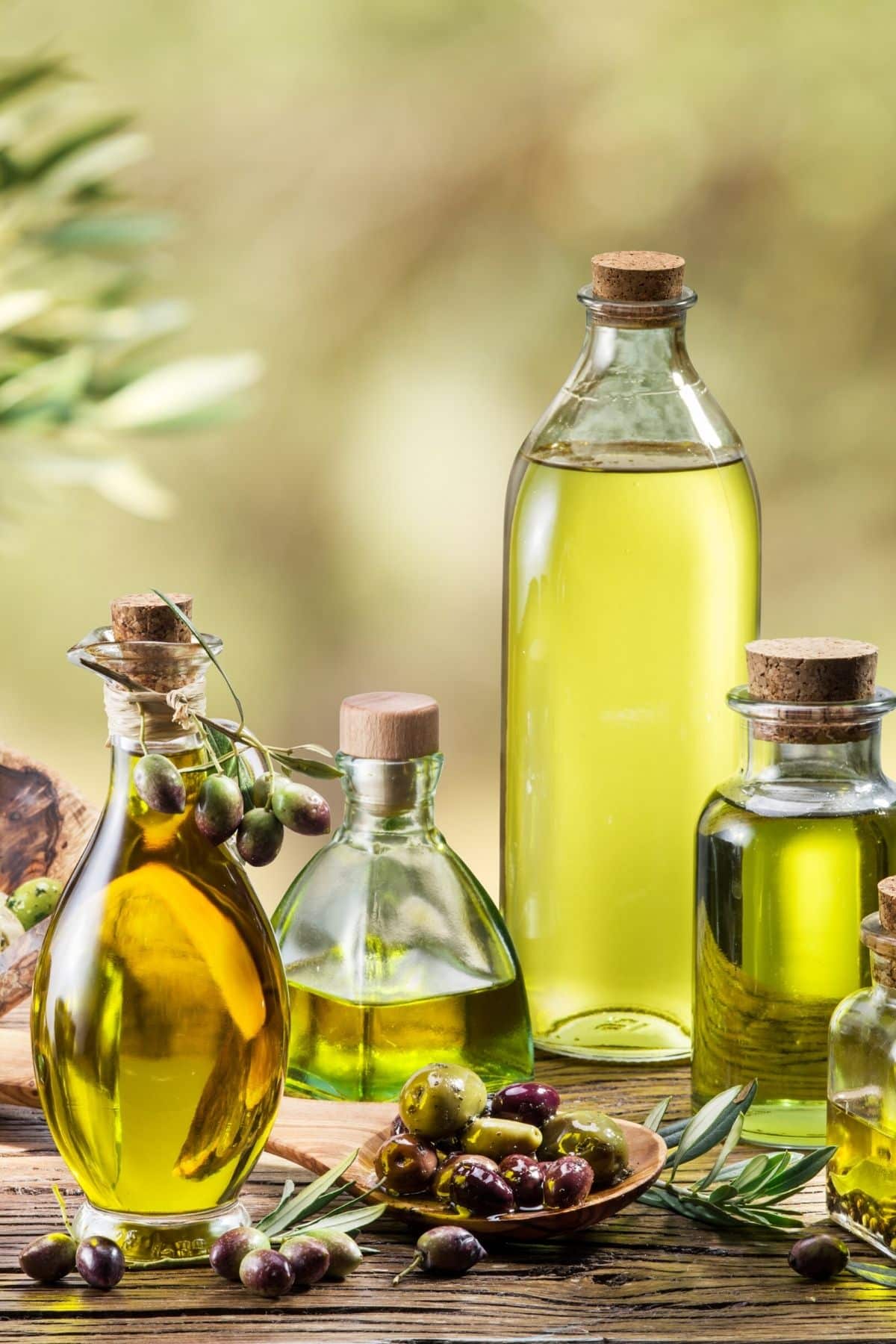
Olive oil is the main fat source of the Mediterranean diet. This diet promotes the consumption of olive oil along with lots of whole grains, plant-based food, and seafood. One of the best testaments to its health benefits is the higher life expectancy of people who follow it.
Extra virgin olive oil is generally one of the healthiest types of oil to use in your recipes.
This is because it is cold-pressed, which means the oil is extracted using pressure only. This minimal processing leaves its all-important nutrients intact. It also gives the olive oil a fruitier, fresher flavor.
Substitutes for Olive Oil
Here are some great alternatives to olive oil for either cooking or using in salad dressings.
1. Coconut oil
Made from pressed coconut meat, coconut oil is a healthy alternative to olive oil. It comes in unrefined and refined forms, both of which contain beneficial lauric acid.
Unrefined coconut oil (also known as virgin coconut oil) has undergone minimal processing and is solid at room temperature.
Whilst it is a little more nutritious than refined oil, it has a fairly low smoking point. This makes it unsuitable for frying, high-heat cooking, and better for baking or sautéing.
Be careful when using it, though, as it does have quite a strong coconut flavor. This can be a tasty addition to some dishes, but might not go so well with others!
A better choice for frying is refined coconut oil. It has a neutral flavor and a higher smoke point, so you can use it when cooking at higher temperatures. Refined coconut oil is also better for salad dressings because it remains a liquid at room temperature.
You can use coconut oil instead of olive oil with a 1:1 ratio.
2. Butter or ghee
It has a richer flavor than olive oil and a slightly lower smoke point, but butter can work well as a substitute in some dishes. It’s especially good for sautéing vegetables and is great for pasta sauces, giving them a delicious richness.
You can also use melted butter as a replacement for olive oil when baking.
For every tablespoon of olive oil needed in a recipe, use a tablespoon plus a teaspoon of butter.
Ghee – which is butter that has been clarified and separated from water and milk solids – works even better! This is because it has a much higher smoke point and won’t burn like butter does at very high temperatures. Ghee contains just a very small amount of lactose, so it is a better choice than butter if you are lactose intolerant.
You can use ghee for sautéing, pan-frying, and roasting. It can even be used for deep frying, making it more versatile than olive oil. See my recipe for ghee-roasted vegetables.
Use ghee as a substitute for olive oil with a 1:1 ratio.
Note: you won’t be able to use ghee or butter as an olive oil substitute in salad dressings. Avocado oil would be a better option.
3. Avocado oil
Not only is avocado oil a great replacement for olive oil in your recipes, it is also very nutritious! Rich in oleic acid, – a heart-healthy monounsaturated fat – it also contains lots of lutein which has benefits for your eyes.
And because it is a good source of vitamins A and E, it’s good for your skin, too!
The very high smoke point of avocado oil makes it good for everything from sautéing and frying to grilling and searing. It has a relatively light flavor, so you can use it in baked goods without affecting their overall taste.
Look for cold-pressed avocado oil for the maximum health benefits and use the same quantities in your recipes as you would olive oil.
Avocado oil is a great alternative to olive oil for salad dressings.
4. Lard
Lard – and other animal fats like tallow and goose or duck fat – have a very high smoke point. They make excellent replacements for olive oil in recipes where lots of heat is required.
Whilst they cannot be used to replace olive oil in cold dishes like salad dressings, they are ideal for everything from baking to frying.
Tallow, in particular, has a smoke point of 400°F/250°C, so it’s a great choice for deep frying. As a bonus, animal fats can actually improve the taste of your dishes, adding richness and deepening their flavor.
You can replace the olive oil in your recipe with an equivalent amount of animal fat.
5. Cold-Pressed Seed Oils
If you’re looking for the best olive oil substitute for salad dressings, you’re best bets are to go with cold-pressed nut or seed oils like walnut oil, pumpkin seed oil, grapeseed oil, sesame oil, almond oil, or similar oils.
Don’t use heat with these delicate oils, but use them for dressings such as in my Honey Mustard Salad Dressing or my Simple Vinaigrette recipe.
Can You Use Extra-Virgin Olive Oil in Cooking?
But, extra virgin olive oil isn’t suitable for all your cooking needs.
It has quite a low smoke point (the temperature at which it starts to produce smoke when heated). Heat also has an adverse effect on its flavor. This makes extra virgin olive oil better suited to cold dishes, salads, dressings, and recipes that are cooked only briefly at low temperatures.
For pan-frying, experts recommend that you use a lighter, more refined olive oil. This will have a more delicate, less overpowering flavor and a higher smoke point. It will, however, be lower in nutrients than extra virgin olive oil.
For deep frying, you should avoid olive oil altogether, because its low smoke point means it will overheat.
If you don’t have any olive oil to hand – or if you are looking for another healthy oil that is stable at high temperatures – you have a few good alternatives.
The best oil to choose will depend on the type of food you are preparing, as some substitutes work better in certain dishes than others.
Here are some good oils to try, along with a few tips for cooking with them.
See my complete list of the safest cooking oils and my article answering the question is refined avocado oil healthy?
Substitutes to Olive Oil for Salad Dressings
If you’re looking for alternatives to olive oil in salad dressings, here are some flavorful options:
- Avocado oil – A mild, buttery oil with a smooth texture. It blends well with citrus, herbs, and creamy ingredients like tahini or Dijon mustard.
- Walnut oil – A rich, nutty oil that works well in vinaigrettes. Best used in cold dressings since heat can make it taste bitter. Pairs well with balsamic vinegar, honey, or mustard.
- Sesame oil – Regular sesame oil has a mild taste, while toasted sesame oil is bold and aromatic. The toasted version is great for Asian-inspired dressings with soy sauce, ginger, or rice vinegar.
- Coconut oil – Slightly sweet with a mild coconut flavor. Best for warm dressings or tropical-inspired vinaigrettes. Since it solidifies when cool, mix it with another liquid oil or warm it slightly before using.
Each of these oils adds a unique flavor to salad dressings, allowing you to experiment and customize based on your taste preferences.
FAQs
Technically, yes, but vegetable oil is considered a pro-inflammatory oil and you may wish to avoid it for health reasons. Choose one of the other olive oil substitutes in this article over vegetable oils. Vegetable oil is another name for canola oil, soybean oil, and corn oil.
I love using melted coconut oil, avocado oil, or ghee. Each will give different flavors so it depends on the baking recipe.
More Substitutes Articles You Might Like
- Substitutes for Bay Leaves
- Substitutes for Coconut Aminos
- Substitutes for Garam Masala
- Substitutes for Ghee
- Substitutes for Marjoram
- Substitutes for Lemongrass
- Substitutes for Oregano
- Substitutes for Sage
Don’t Miss These Helpful Cooking Articles
Conclusions
Olive oil is a popular ingredient for cooking thanks to its many health benefits. But if you happen to run out, it’s good to know that there are several equally delicious alternatives! If you’ve never tried some of these healthy oils before, then it’s the perfect excuse to give them a go and see how they may even improve some of your finished dishes.
Don’t forget to join my newsletter list to get exclusive clean eating recipes and tips. The newsletter is 100% free with no spam; unsubscribe anytime.
About the Author: Carrie Forrest has a master’s degree in public health with a specialty in nutrition and is a certified holistic nutritionist. She is a top wellness and food blogger with over 5 million annual visitors to her site. Carrie has an incredible story of recovery from chronic illness and is passionate about helping other women transform their health. Send her a message through her contact form.


